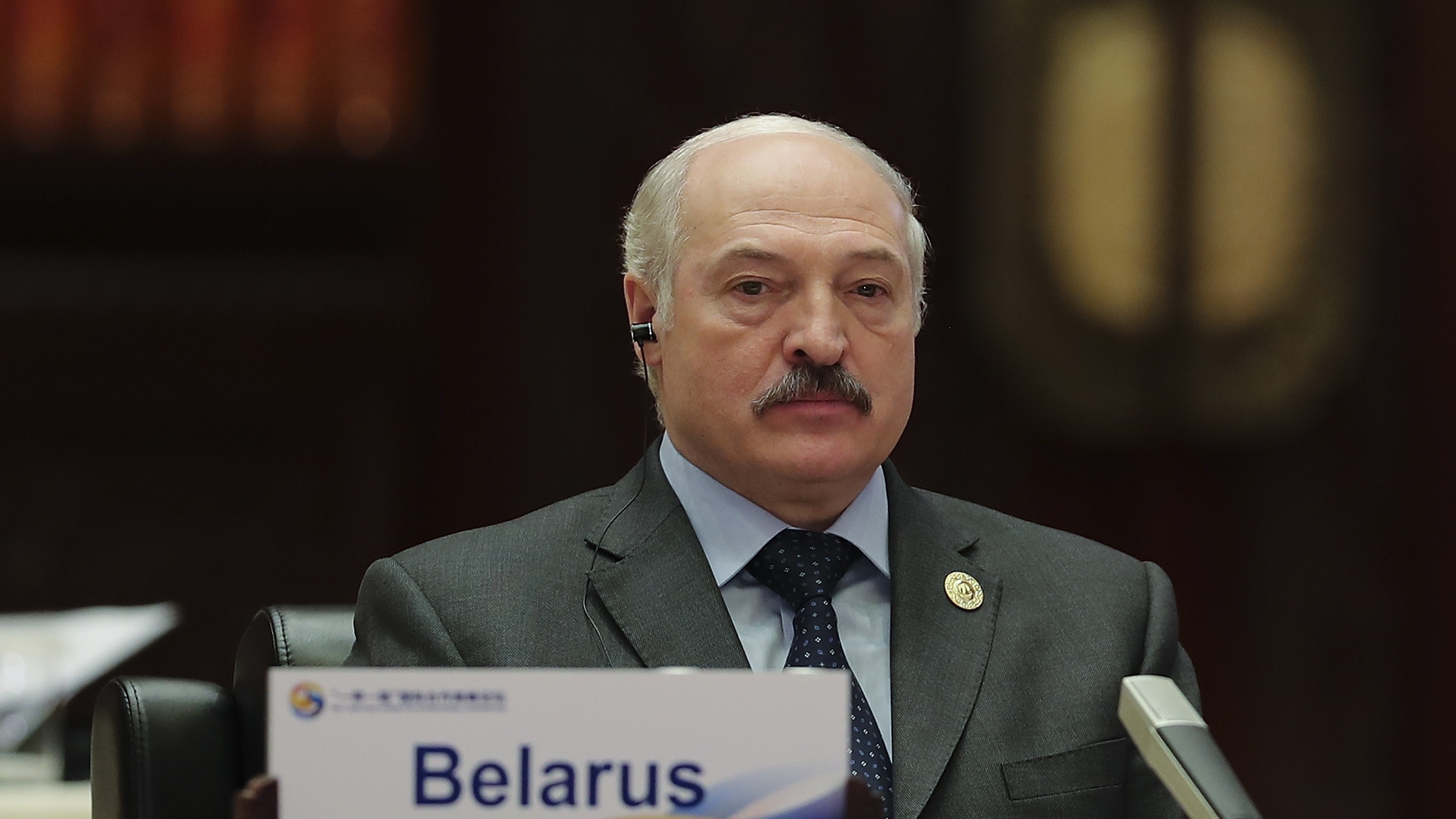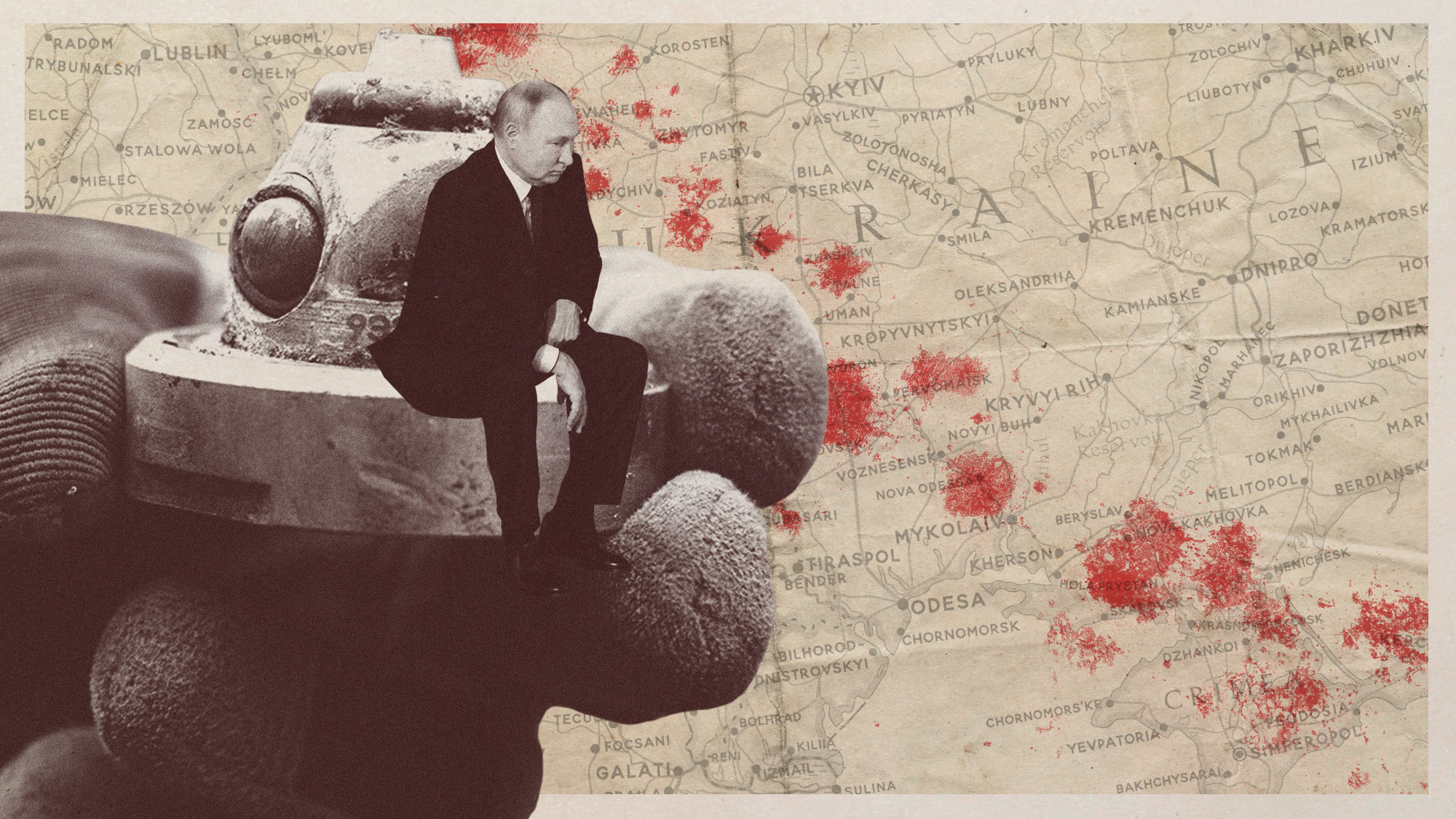Russia ‘wary’ of defending ally Belarus amid plane hijack row
Moscow on defensive as EU threatens economic sanctions against Minsk

A free daily email with the biggest news stories of the day – and the best features from TheWeek.com
You are now subscribed
Your newsletter sign-up was successful
The Kremlin has accused the UK of harbouring an “obsession” with Russia after Dominic Raab suggested that Moscow must have approved the forced landing of a Ryanair plane by Belarus.
A spokesperson for Vladimir Putin said the accusation was grounded in a “Russophobic obsession, an obsession with blaming Russia for everything and everyone”, adding: “It will probably soon come to the point that Russia is accused of the very fact of its own existence.”
Countries worldwide have condemned Belarus for “hijacking” the Ryanair flight on Sunday in order to arrest one of the passengers, dissident journalist Roman Protasevich. But Russia’s response has been “muted”, says The Moscow Times - a reaction that analysts reportedly believe “speaks to the Kremlin’s ambivalent view of Belarus’s longtime strongman president Alexander Lukashenko, who is at once a beleaguered ally increasingly dependent on Moscow’s goodwill, and a troublesome partner”.
The Week
Escape your echo chamber. Get the facts behind the news, plus analysis from multiple perspectives.

Sign up for The Week's Free Newsletters
From our morning news briefing to a weekly Good News Newsletter, get the best of The Week delivered directly to your inbox.
From our morning news briefing to a weekly Good News Newsletter, get the best of The Week delivered directly to your inbox.
Air war
Lukashenko hit back at critics of his regime on Monday, after both the UK and the EU told airlines to avoid Belarusian airspace.
In what The Times describes as a “rambling address” to the Belarusian parliament, the president accused “ill-wishers from outside and inside the country” of changing “their methods of attacking our state”.
“They have crossed many red lines and crossed the boundaries of common sense and human morality. They have moved from organising riots to the stage of strangulation,” he told lawmakers.
A free daily email with the biggest news stories of the day – and the best features from TheWeek.com
Belarus had no choice but to divert the plane following reports of a bomb on board, said the president, who claimed that the warning had come from within Switzerland. Belarusian officials had previously claimed that Hamas threatened to blow up the plane, an allegation that the Palestinian militant group denies.
Lukashenko “also appeared to suggest that Belarus would have been within its rights to shoot down the Ryanair plane because it was flying near a Belarusian nuclear power station”, The Times reports.
Underlining the alleged danger, he asked: “What if the nuclear power station’s safety systems were suddenly put on full alert?”
Critics including the UK foreign secretary remain unconvinced by Lukashenko’s claims - and by Russia’s show of outrage.
Moscow has previously “backed the Lukashenko regime with loans and cheap energy resources”, but has moved to “distance itself from the hijacking”, The Telegraph reports.
But Raab told the Commons on Monday that while Downing Street did not have “any clear details at this stage” about possible Russian involvement, it was “very difficult to believe that this kind of action could have been taken without the acquiescence of the authorities in Moscow”.
Cooling relations
“A new wave of sanctions and restrictive measures on Belarus’s aviation industry, severing its direct links with much of Europe, looks set to increase the country’s reliance on Russia,” writes The Guardian’s Moscow correspondent Andrew Roth.
But despite the Kremlin’s long-standing support for Lukashenko, who has been in power for 26 years, Moscow “appears wary” of backing him amid such widespread opposition, Roth adds.
In the hours immediately after Belarus “shocked the world” by forcing the plane to land in Minsk, Russian officials “maintained conspicuous radio silence on the events”, says The Moscow Times.
International security expert Mark Galeotti told The Guardian that the Kremlin was “not going to go out of its way to critique what Belarus has done”. But “conversely, it’s not leaping in with full-throated support because it does not want to be caught in the fallout”, he said.
The EU yesterday issued a joint statement saying that “the European Council strongly condemns the forced landing of a Ryanair flight in Minsk”, with the bloc threatening “further targeted economic sanctions” against Belarus.
As the Western powers mull their response, Galeotti argues that the key “question is going to be: is this it?”
Along with “the rest of us”, Moscow is “waiting to see if the sanctions move into a new phase”, he says. “If this is all they have to face then I reckon they will feel that they got away with it.”
Meanwhile, Lukashenko is plotting his next move. Although he was elected on a “pro-Russian, Soviet nostalgic ticket”, the Belarusian leader has “always prioritised his own freedom of manoeuvre over ties with Moscow”, says The Moscow Times.
“I believe that Lukashenko acted alone, without Russian involvement,” Tatiana Stanovaya, founder of the R.Politik political consultancy, told the paper.
“The Russian leadership is shocked by this but can’t publicly show it as they have to protect their geopolitical interests,” she added. “They see now who they are dealing with.
“In the Kremlin’s eyes, Lukashenko has become a problem that needs to be addressed.”
-
 Mixing up mixology: The year ahead in cocktail and bar trends
Mixing up mixology: The year ahead in cocktail and bar trendsthe week recommends It’s hojicha vs. matcha, plus a whole lot more
-
 Labor secretary’s husband barred amid assault probe
Labor secretary’s husband barred amid assault probeSpeed Read Shawn DeRemer, the husband of Labor Secretary Lori Chavez-DeRemer, has been accused of sexual assault
-
 Trump touts pledges at 1st Board of Peace meeting
Trump touts pledges at 1st Board of Peace meetingSpeed Read At the inaugural meeting, the president announced nine countries have agreed to pledge a combined $7 billion for a Gaza relief package
-
 New START: the final US-Russia nuclear treaty about to expire
New START: the final US-Russia nuclear treaty about to expireThe Explainer The last agreement between Washington and Moscow expires within weeks
-
 What would a UK deployment to Ukraine look like?
What would a UK deployment to Ukraine look like?Today's Big Question Security agreement commits British and French forces in event of ceasefire
-
 Trump peace deal: an offer Zelenskyy can’t refuse?
Trump peace deal: an offer Zelenskyy can’t refuse?Today’s Big Question ‘Unpalatable’ US plan may strengthen embattled Ukrainian president at home
-
 Vladimir Putin’s ‘nuclear tsunami’ missile
Vladimir Putin’s ‘nuclear tsunami’ missileThe Explainer Russian president has boasted that there is no way to intercept the new weapon
-
 How should Nato respond to Putin’s incursions?
How should Nato respond to Putin’s incursions?Today’s big question Russia has breached Nato airspace regularly this month, and nations are primed to respond
-
 Russia’s war games and the threat to Nato
Russia’s war games and the threat to NatoIn depth Incursion into Poland and Zapad 2025 exercises seen as a test for Europe
-
 What will bring Vladimir Putin to the negotiating table?
What will bring Vladimir Putin to the negotiating table?Today’s Big Question With diplomatic efforts stalling, the US and EU turn again to sanctions as Russian drone strikes on Poland risk dramatically escalating conflict
-
 Ottawa Treaty: why are Russia's neighbours leaving anti-landmine agreement?
Ottawa Treaty: why are Russia's neighbours leaving anti-landmine agreement?Today's Big Question Ukraine to follow Poland, Finland, Lithuania, Latvia and Estonia as Nato looks to build a new ‘Iron Curtain' of millions of landmines